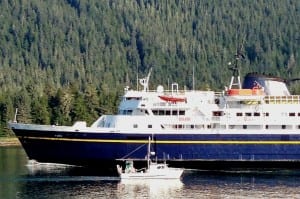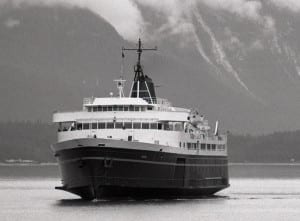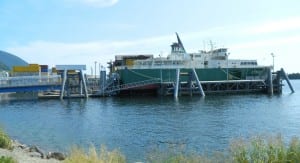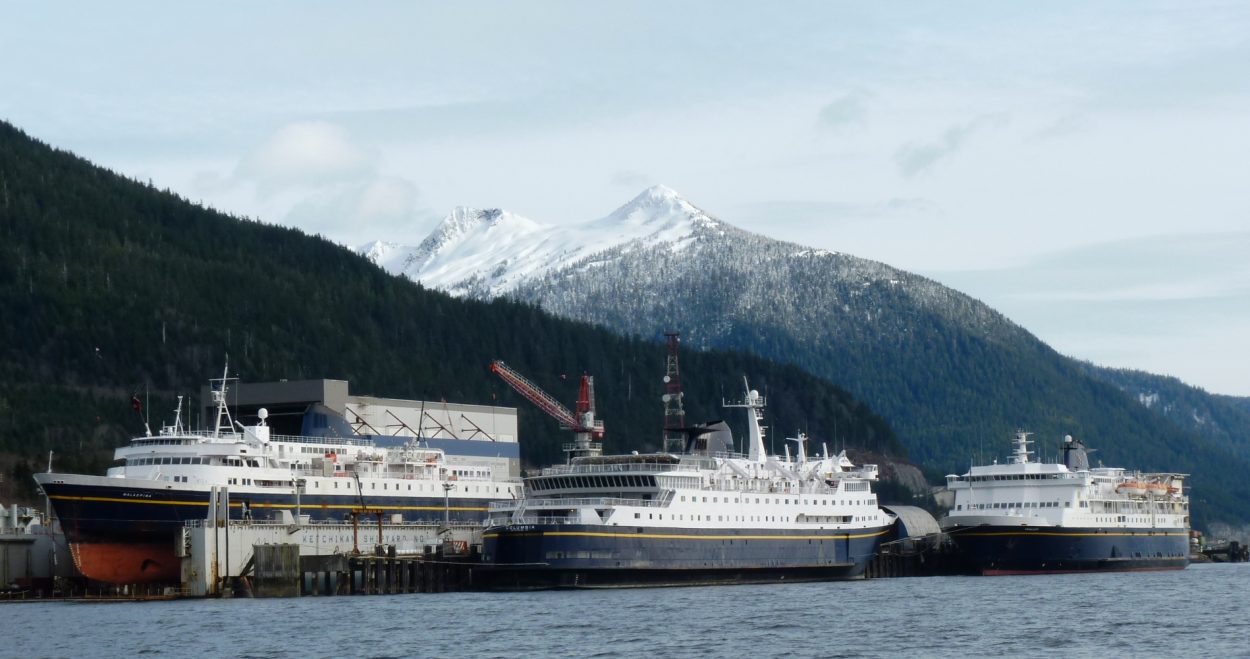
The ferry Taku sails into the Wrangell Narrows on its way south in 2013. It’s part of an aging fleet needing repair or replacement. (Ed Schoenfeld/CoastAlaska News)
Change was the theme of the Alaska Marine Highway System presentation during Day 1 of Southeast Conference’s annual fall meeting in Prince Rupert, British Columbia.
Mike Neussl is the ferry system’s deputy commissioner, and he says change has been rather suddenly forced upon the system.
“As long at the Legislature was willing to write those checks for $100-plus million a year to the Marine Highway System, that was all well and good and nobody complained much. Three years ago, when I said we need to raise rates and fix our tariff structure, because it’s got a bunch of anomalies in it, I kind of got that ‘Well, let’s not upset the apple cart.’ Now, I get questioned, how come I haven’t raised rates faster? It’s been kind of a total turnaround. And it’s all driven by the budget situation for the state.”
The state is facing a huge budget deficit because of low oil prices, leading to low oil tax revenue. Every state agency had to cut spending this last budget cycle, and will have to again this coming fiscal year.
The Alaska Marine Highway System is an expensive state service. Over the past 30 years, Neussl says, revenue from ferry fares hasn’t changed much, but costs have gone up, especially after the system added ships to the fleet.
“We had a ship of nine ships, or eight ships. Now we have a fleet of 11

The ferry Taku sails into Juneau’s Auke Bay terminal. It’s tied up for the year, affecting seafood processors who transport their fish via Prince Rupert, British Columbia. (Photo by LCGS Russ/Wikimedia Commons)
ships. More ships, more fuel, more crew. On the good side, more convenient schedules, more frequent service, more ability to use the marine highway system because we had more available, but on a down side, that all came with a cost. A pretty significant cost.”
Neussl says the ferry system made some on-board service cuts, such as removing bars and gift shops, laying off some employees, etc., but it also reduced port calls.
Some people in the audience weren’t happy about those reduced port calls, especially when smaller communities such as Kake will be without any service for about a month, when its ferry is due for maintenance.
Others liked some ideas suggested by another speaker, Dave Kensinger, who uses the ferry system to deliver goods throughout Southeast.
He agrees the Alaska Marine Highway System needs to change, but he had some more significant changes in mind.
Kensinger says the first thing that needs to change is the Marine Transportation Advisory Board. He says it needs to lose the “advisory” part of its name and become a board that can make decisions. Kensinger says that was the original plan for the board when it was formed by the Legislature.
“It passed both chambers, it was amazing. The Senate agreed, the House agreed. Both sides of the aisle. But then Gov. (Sarah) Palin, hadn’t really read the legislation, she was going to veto it because it was going to diminish the power of the governor. So, we made it an advisory board. I kind of sat back for 10 years to see how this was working and I hate to say it but it hasn’t worked.”
The next thing Kensinger recommends is getting rid of almost all the mainliners, and seriously considering canceling the run to Bellingham, Washington.
He says the priority should be providing transportation to people on islands with no road access. Kensinger says smaller ferries with consistent schedules can better serve all of Southeast, and it will be less expensive than the current system.
 He pointed to the Inter-Island Ferry Authority, which serves Ketchikan and Prince of Wales Island, as an example of how such a service can succeed.
He pointed to the Inter-Island Ferry Authority, which serves Ketchikan and Prince of Wales Island, as an example of how such a service can succeed.
“By any standard of public transportation, the IFA is wildly successful. By providing consistent, daily, year-in-year-out service, the numbers that they carry and the cost that it costs them to carry those numbers, when you compare them to the Marine Highway System, are amazing. That’s what you need.”
When asked for input, audience members supported the idea of smaller ferries providing consistent schedules. They also suggested ways to cut costs – such as removing food service – as well as ways to make the system more user friendly – such as providing wifi.
The three-day Southeast Conference started Tuesday morning in Prince Rupert, British Columbia. On the schedule for Wednesday are presentations about the general regional economic outlook, and economic opportunities in the maritime industry and mining.
Southeast Conference is the official regional economic development organization for Southeast Alaska. It formed in 1958 to facilitate the creation of a marine transportation system in Alaska’s Panhandle. Southeast Conference now has about 180 members, including the City of Prince Rupert.






